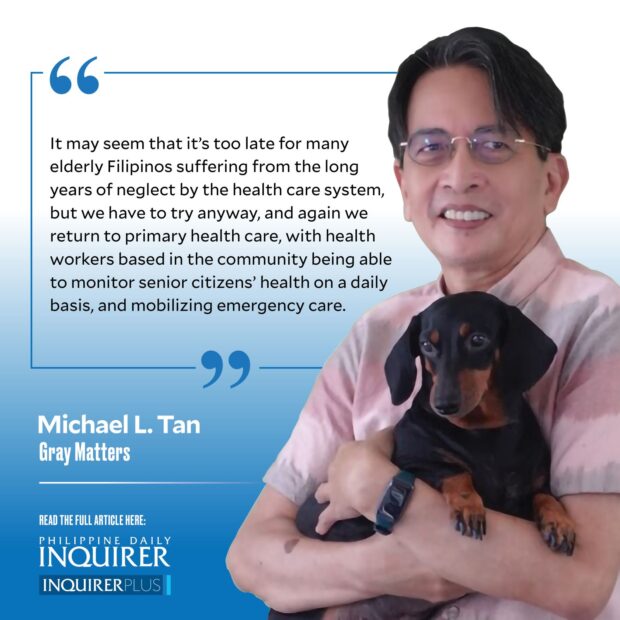Living longer and better

We live in complex times, most certainly if we are talking about health care. Dr. Atul Gawande, a well-known American surgeon and writer (several books, plus regular articles for some time in The New Yorker) described the challenge in a commencement exercise back in 2020 at Stanford’s medical college: close to 14,000 possible diagnoses, more than 6,000 drugs, and 4,000 medical and surgical procedures.
I first read his commencement speech several years ago and had been quoting him several times when lecturing at University of the Philippines and Ateneo’s medical school, usually to new medical students. Then I got an invitation to hear him, in person, with an intriguing title for his lecture: “How Filipinos Can Live Longer.”
Gawande did not disappoint his many “fans.” He started off with the figures on health care’s complexities and then explained that mistakes are bound to happen either because of ignorance or, worse, ineptitude, which is having knowledge but failing to apply it correctly.
Article continues after this advertisementYet, Gawande has been a crusader for reforms to reduce the mistakes. For many years, he did this in hospitals, describing his experiences in a book, “The Checklist Manifesto,” where he explains how very simple checklists can dramatically result in “accidental” deaths.
He modeled the checklists from those used in the construction and aerospace industries, which cannot afford any lapses in safety. What’s more surprising is the stuff that appears in the checklists, an example being the need for the people in a surgery room to introduce them as one of the first procedures on the checklist. The reason is simple: successful surgery relies on teamwork.
Now, as the director of USAID’s international health programs, Gawande aims to increase life expectancy as rapidly as possible, as has been done in five middle-income countries. He shared observations from Thailand, which he had just visited before the Philippines and where life expectancy rose from 71 (which is where the Philippines is today) to 80 years, which is the figure for the United States), the improvement made within a decade.
Article continues after this advertisementThe key to longer, healthier lives, Gawande explains, is primary health care. This is different from primary care, which describes the level or capability of a hospital to handle cases, depending on facilities and personnel. Primary health care, on the other hand, is quality care offered at the community level, supported by universal health coverage (UHC), which the Philippine government has been trying to roll out for several years now. UHC will bring in a new health insurance system as well as reforms in health care that should, in principle, empower community health workers (in our case, barangay health workers) to provide much-needed health care, from routine but life-saving procedures like immunizations to emergency care.
Primary health care was introduced in the Philippines in the early 1970s, with the World Health Organization’s grand call of “Health Care for All by the Year 2000.” Sadly, over the years, rather than moving forward, we found primary health care dismantled, sometimes by governments themselves, with their paranoid fears of citizens who might end up too empowered as they manage their health.
USAID’s plans are not for free care, which politicians love for the votes they can generate, but for measures that can preempt complications and illnesses. Gawande spoke of digital X-rays that can be done at the barangay with a laptop, to be “read” by an AI (artificial intelligence) system (presumably with subsequent confirmation by humans). He spoke, too, of digital mammograms, noting that only 1 percent of breast cancer cases are diagnosed when the cancers are still in an early stage.
Physicians and other health professionals will serve, Gawande feels, at the primary health care level if salaries are adequate and if there are adequate equipment and facilities. In Estonia, he said, 50 percent of specialists switched to primary health care when salaries were given a hefty increase.
Gawande spoke of many other challenges for Filipinos to live longer, notably caring for the elderly, and one particular piece of advice resonated with older people in the audience, including myself. He noted how senior citizens’ health is tied to the health care they had in their younger years.
It may seem that it’s too late for many elderly Filipinos suffering from the long years of neglect by the health care system, but we have to try anyway, and again we return to primary health care, with health workers based in the community being able to monitor senior citizens’ health on a daily basis, and mobilizing emergency care.
Ultimately though, we return to Gawande’s point about ignorance and ineptitude. Primary health care democratizes access to information and people will live longer if they have access to the information they need, working with motivated community workers, with the appropriate technology and facilities.
mtan@inquirer.com.ph
















